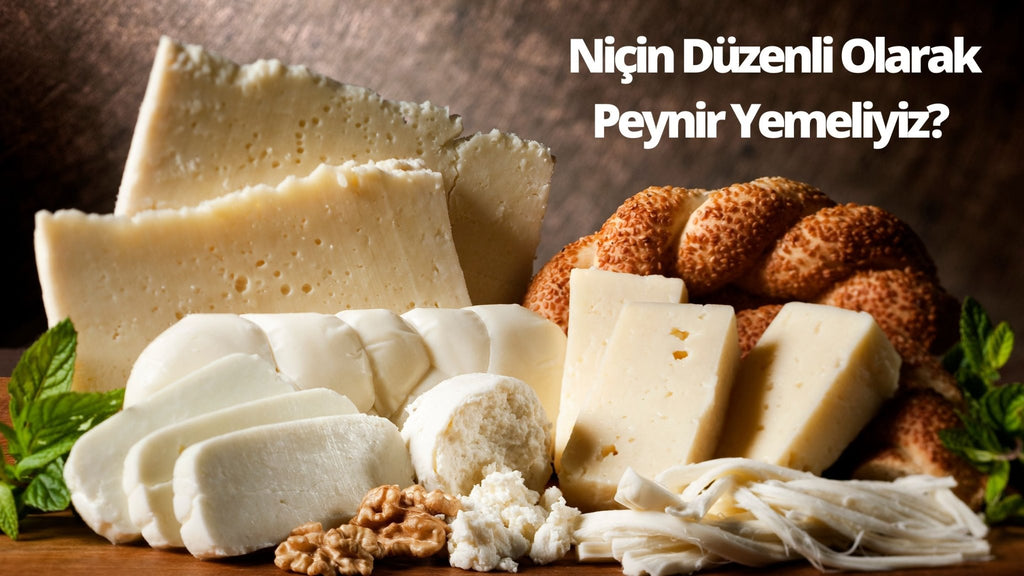Why Should We Eat Cheese Regularly?

It would not be an exaggeration to say that cheese is the indispensable product of our breakfast. Cheese is one of the most important dairy products consumed by people, and according to statistics recorded in 2020, a person consumed an average of approximately 40.2 kilograms of cheese per year. The oldest cheese in the world dates back to ancient times. History says that Egyptians discovered cheese in ancient times. It tasted sour and salty and had a crumbly texture. Today, cheese is produced in different tastes, textures, shapes and sizes. Cheese is good for our health. Like all other dairy products, it is rich in calcium and protein.

The history of cheese dates back 10 thousand years
Hints of the existence of cheese are as old as modern humanity, dating back to 8 thousand BC, when the first sheep and goats were domesticated by our ancestors. Surviving records of their lifestyle show that they used animal skins and inflated internal organs as storage media. This leads to the assumption that the first discovery of cheese making was probably discovered by chance. Storing milk in such a way will bring the milk into contact with rennet, which will quickly turn the milk into curds and whey.
The earliest archaeological evidence of the existence of cheese dates back to 5,500 BC, when the first visual clue was recorded on Egyptian tomb walls nearly 4 thousand years ago. Samples of cheese made at that time in Egypt and the Middle East likely had a very salty and strong taste and a crumbly texture. It is thought to be similar to today's cottage cheese and feta cheese. Since this geography was a hot region, people had to use plenty of salt as a natural preservative.

Developed in the Mediterranean basin
As the art of cheesemaking spread northward from Egypt, Greece and Rome became the birthplace of many more types of cheese, where low temperatures enabled cheesemakers to experiment not only with rennet and other acidic substances that could turn milk into cheese, but also with many other substances. With the types of bacteria that could be used to create medium and hard cheeses, with less salt and preservatives, European cheeses tasted much more pleasant, and many types of cheeses with different flavors quickly emerged.
History records surviving from the Roman Empire describe ancient ways of making many types of cheese. Unfortunately, after the fall of the Roman Empire, trade routes across Europe collapsed, preventing the easy sharing of knowledge and goods and making cheesemaking a highly competitive local production. Many of today's popular cheeses were made before the advent of the Renaissance and the establishment of new trade routes. Cheddar around 1200 and Parmesan in the late 1590s.

First fabricated production in 1815
With the advent of the Renaissance and the advancement of sea travel, cheese spread from the shores of Europe to all over the world. Many Asian cultures had never heard of cheese before, except in India. The situation was the same for America. Organized cheese production came to Europe with the establishment of the first cheese factory in Switzerland in 1815, but major success was achieved only when dairy farmer Jesse Williams established his assembly line cheese factory in the United States in 1851. Just decades later, cheese production in North America reached record levels. Today, many types of cheese are produced in factories, but cheeses produced by hand using traditional recipes are still produced. So what are the benefits to our health?

source of calcium
Our body needs different minerals to function better. The most important among these is calcium. Calcium helps our vascular functions, nerve conduction and supports bone health.
Our bones are an integral part of our body. They continue to evolve and change as we grow. Our body cannot create new calcium. We continue to lose calcium through dead skin cells. Therefore, a balanced calcium intake is very important.
Cheese is an excellent source of getting our daily calcium intake without supplements. According to a study, Parmigiano Reggiano, a type of cheese, is the best source of calcium.

anti-obesity
Many nutritionists and scientific studies link obesity and weight gain with hypertension. But unfortunately, it also leads to an enlarged left ventricle, which increases the risk of heart failure. According to the study, there is evidence of a non-harmful association between cheese consumption and total cardiovascular disease risks.

Helps to lose weight
To lose weight, you cut out sugars and starches or carbohydrates. But it's not about eating less, it's about eating healthy. Cheese is rich in calcium and protein. When you get enough calcium, you burn more fat. Additionally, the proteins found in cheese speed up your metabolism and reduce your appetite.

It is good for dental health
When it comes to health, our teeth are often neglected. But don't worry, because cheese is one of the food items that also work effectively on your teeth. According to a study, cheese has high levels of phosphate and calcium. They naturally strengthen teeth and bones. It also helps balance the pH level of your mouth. A balanced pH level means less acid, which harms your mouth. It also cleans your saliva and prevents cavities.

Rich in vitamin B-12
According to research, several dairy products, such as cheese, help provide vitamin B-12. B12 also helps improve metabolism. Cheese is an excellent source of protein, especially for vegetarians. For example, full-fat Swiss cheese, Cheddar cheese, and Paneer or Cottage cheese have the highest Vitamin B-12.

Helps your skin shine
You're shedding skin cells throughout the day, so it's important to keep your skin glowing and in good condition. An effective routine can help prevent acne, treat wrinkles, and keep your skin looking its best. Additionally, vitamin B in cheese helps cells grow. Thus, you will have glowing and blemish-free skin.

Flavors from around the world
You can find the sought-after gourmet tastes of breakfast tables at Fair. We carefully select and bring hundreds of products from the region in our delicatessen section , such as gruyere from the Netherlands, black cumin cheese from Erzincan, and obruk cheese from Konya.
-
Posted in
ataşehir, ataşehir şarküteri, kahvaltı, peynir, şarküteri




